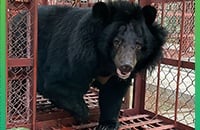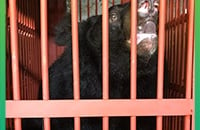20 years and 400 bears – how change was made
14 June 2013
|
When a farmer in Northern Vietnam decided the bear he once farmed for its bile deserved a better life with Animals Asia, he could have had no idea of the significance of the decision. For Animals Asia the rescue happened 20 years on from founder Jill Robinson’s first visit to a bear bile farm and the bear, Ung Hoa, was to be the 400th rescued by the organisation. Even more poignant were the details of how the decision was reached. Since 2002 bear bile farming has been illegal in Vietnam but many bears still remain in cages. Loopholes have been found by those who seek to exploit the bears, while state resources to hold them to account remain limited. But this farmer had long since stopped extracting bile. His bear had become a family pet and as they started to care about her welfare then they also started to care about her future. It was the farmer’s children that made contact with Animals Asia but it was the farmer himself who made the decision to turn down cash offers from elsewhere. It was a decision which meant all he gained was our profound thanks and his own peace of mind – knowing she would be cared for. It’s also a decision that 20 years ago would have been unthinkable for any bear bile farmer in China or Vietnam. |
|
|
20 Highlights in 20 Years: How the campaign to end bear bile farming grew to become millions strong 1. Jill makes her first undercover visit to a bear bile farm in southern China. The visit results in her pledge to end bear bile farming and the start of intensive negotiations begin with Chinese authorities to put an end to the industry. 1993 2. The first group of nine bears are rescued from a farm in Huizhou, southern China. Jill and Animals Asia co-founders Boris Chiao and Gail Cochrane, then consulting for the International Fund for Animal Welfare, establish China's first bear rescue centre (subsequently managed by IFAW). The bear farm is closed down. 1995 3. Animals Asia is established. 1998 4. Animals Asia investigators accompany Chinese authorities from Beijing to 11 bear farms in Sichuan Province. 1999 5. Negotiations start on the establishment of a bear sanctuary in Chengdu, Sichuan province. 1999 6. Animals Asia signs a landmark agreement with the Chinese government to build a bear sanctuary and construction begins on the China Bear Rescue Centre. 2000 7. The first 60 bears arrive at the new sanctuary. “Andrew” is bear No 1. 2000 8. Asian superstar, actress and singer Karen Mok joins Animals Asia’s campaign against bear bile farming - a star so influential that four years later she would carry a torch at the Beijing Olympics. 2004 9. Animals Asia signs a Memorandum of Understanding with the Vietnamese authorities to build a bear sanctuary in Tam Dao National Park. 2005 10. Animal Planet shows the documentary, "Moon bears: Journey to Freedom", narrated by British actor and writer Stephen Fry. International awareness of bear bile farming continues to grow. 2007 11. Construction starts on phase one of the Vietnam Bear Rescue Centre and its first residents arrive – three tiny cubs. 2007 12. Noted Pathologist Dr Wang Shengxian assists Animals Asia in examining 49 tissue samples from rescued bears and concludes all are sick as a result of bile extraction. He further points out that bile produced by farmed bears is a danger to consumers. The findings are passed to the China Wildlife Conservation Association, which forwards the report to the Ministry of Health, the State Food and Drug Administration and the Traditional Chinese Medicine Administration Bureau. 2008 13. Mdm Zhou Ping a National People’s Congress (NPC) member files a proposal to end bear bile farming. Three years later she would be joined by a number of fellow NPC members and CPPCC (Chinese People’s Political Consultative Conference) delegates, including China’s former head veterinarian and the editor of a respected literary magazine. They have continued to offered annual support in every national session since. 2007 14. Our Moon Bear Rescue Centres in China and Vietnam each receive the prestigious 2010 Carole Noon Award for Sanctuary Excellence from the Global Federation of Animal Sanctuaries. 2010 15. Animals Asia rescues 10 more bears from Shandong Province's last farm on 19 April, bringing to 20 the number of provinces now bear-farm free (out of 31), with each committed to remaining that way. It follows a pledge the previous year from 18 provinces plus bear-bile-farm-free Shanghai. 2010 16. An explosion in public support for the campaign to end bear bile farming occurs after industrial bear bile farmers Guizhentang announces its intention to float on the stock exchange. In the aftermath, that carried on into the following year, 87 per cent public opposition to the industry is reported – literally hundreds of millions of Chinese people. In one month alone Animals Asia features in 6,243 articles in China. Little more than a year later, China’s increasingly influential wildlife activists announce they are taking legal action against the industry. 2011 (Floatation finally cancelled in 2013) 17. Over a thousand doctors in China sign a pledge not to prescribe bear bile to their patients as part of Animals Asia’s Healing without Harm programme. The doctors were attending the 8th Shanghai International Forum of Infection Control (SIFIC) that took place in Shandong province. 2012 18. In Vietnam a proposed eviction of the Tam Dao sanctuary fails as Animals Asia is backed by tens of thousands of supporters across the world that stand alongside celebrities, politicians, diplomats, school children and NGOs. The Vietnamese government overturn the eviction order. 2013 19. 30,000 people, including 57 schools in 20 Chinese cities in 16 provinces take part in Love Moon Bears celebrations stretching over a month. Students dance in bear costumes in the streets, mall workers leave their posts to join the celebrations, hundreds of volunteers collect thousands of signatures promising never to use bear bile. 2013 20. Twenty years on from Jill’s first visit to a bear bile farm – a 400th bear is rescued as a farmer in Vietnam decides the bear he once farmed for his bile, deserves a better life. 2013 |
|
BACK








 Freedom after two decades: Moon bears Nang and Mua rescued
Freedom after two decades: Moon bears Nang and Mua rescued
 With heavy hearts we say goodbye to our beloved Tulip
With heavy hearts we say goodbye to our beloved Tulip
 Three moon bears rescued from notorious bear bile farming hotspots in Vietnam
Three moon bears rescued from notorious bear bile farming hotspots in Vietnam